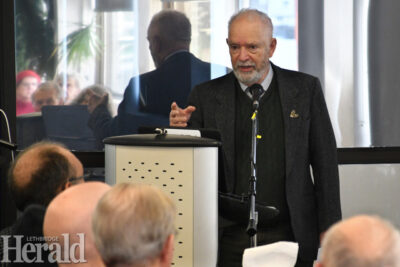Professor addresses ‘big picture’ of climate change at SACPA
By Ry Clarke - Lethbridge Herald Local Journalism Initiative Reporter on February 24, 2023.
 Herald photo by Ry Clarke
Professor Ken Peacock speaks about climate change at Thursday's SACPA session.
Herald photo by Ry Clarke
Professor Ken Peacock speaks about climate change at Thursday's SACPA session.The Southern Alberta Council on Public Affairs heard from University of Lethbridge Professor of Philosophy Ken Peacock on Thursday on the topic of climate change.
Peacock, who works in the philosophy of science department, spoke to audience members about the Conference of the Parties (COP), the issues of climate change, and the goal towards solving it.
“I won’t have time to cover all the issues today, but there are some things that scientists are broadly in agreement about,” said Peacock.
“One of the issues I’m particularly going to talk about is sea level rise. How much ice is going to melt? There are two questions, how much is the ice going to melt? Well they pretty much already know the answer to that question. Unfortunately the short answer is, a hell of a lot. Second question, how long is it going to take? That is something where even top glaciologists are not quite sure how much breathing space we have in terms of time. But right now at our current climate regime, we are dialed in for about 20 metres of sea level rise, give or take.”
Peacock spoke about the debate on urgency, noting the varying factors at play.
“Governments of the world, and the corporate world, want to believe we have lots of time. Other people think we don’t have very much time, but nobody wants to change. And in the meantime, oil drilling is accelerating, coal uses – I don’t know the total global coal use, I haven’t checked that figure. But China and India are both increasing their use of coal. Pakistan is the other one. They are desperate for electricity, and they can’t get enough natural gas. They can’t afford to put in renewables yet so they are building coal plants because it is the only option they have.”
A special report from the Intergovernmental Panel on Climate Change (IPCC) says we need to limit warming to below 1.5-Celsius before 2030 to avoid more extreme climate change.
“Emissions are increasing. There was a little bit of a downturn during the pandemic, not much, but it was a little bit of a down blip. Now it is ramping up again like crazy and no end in sight. Meanwhile, IPCC says if we want to have to have a 66 per cent chance of meeting the 1.5-degrees by 2030, we have to have emissions reduced by 50 per cent. That’s not a political statement, that is based on modelling, and the best scientific evidence they have. And many scientists feel it is far too conservative,” said Peacock.
Speaking to the history of climate and change, Peacock educated the audience about paleoclimate researchers using geologic and biologic evidence preserved in the earth to reconstruct past climate environments around the world. “You can learn a lot from knowing what happened in the past. They know that at times, during the last glacial meltdown, which was 11,000 years ago, that for a period of a few hundred years, the sea level was rising between three and give metres a century,” said Peacock.
“Because what happens is these giant ice sheets, they collapse and then you have a slow steady sea level rise.”
Looking to pass along knowledge while giving educational thought to climate change, Peacock presented information on how the world is looking to change the course of climate change.
“A big part of my message is to be aware, try to see the big picture, and realize we humans are not the only thing in this world. There are things out there that have been around a lot longer than we have,” said Peacock.
13-12


